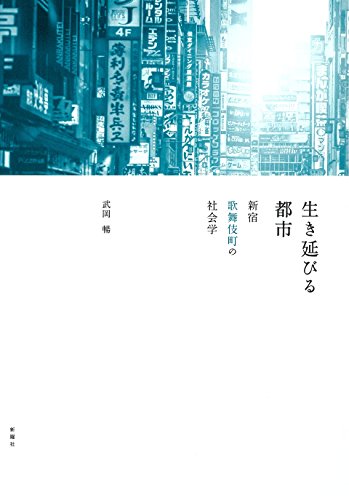- 著者
- 武岡 暢
- 出版者
- 立命館大学産業社会学会
- 雑誌
- 立命館産業社会論集 (ISSN:02882205)
- 巻号頁・発行日
- vol.58, no.2, pp.137-148, 2022-09
4 0 0 0 IR 客引きとスカウトは何故いなくならないのか : 歓楽街のストリートにおける法と経済
- 著者
- 武岡 暢 タケオカ トオル Toru Takeoka
- 出版者
- 立教大学グローバル都市研究所
- 雑誌
- グローバル都市研究 (ISSN:18838006)
- 巻号頁・発行日
- no.6, pp.25-40, 2013
2 0 0 0 OA 下位文化集団の秩序問題 都心繁華街歌舞伎町の商店街組織を事例として
- 著者
- 武岡 暢
- 出版者
- 日本都市社会学会
- 雑誌
- 日本都市社会学会年報 (ISSN:13414585)
- 巻号頁・発行日
- vol.2011, no.29, pp.59-75, 2011-09-07 (Released:2012-12-19)
- 参考文献数
- 15
The aim of this paper is to approach “the problem of order of subcultural groups", derived from Claude S. Fischer's “Subcultural Theory of Urbanism", by analyzing a shopping center organization in Mid-Tokyo's amusement district, Kabukichô. “The problem of order of subcultural groups" can be summarized as the problem of how urban society, consisting of various subcultural groups, can avoid collapsing despite its presence within a highly unstable situation. For this purpose of this study, the following methods were adopted: (1) interviewing members of the shopping center organization, shop-owners, officers of the local government and the police, (2) participant observation in various activities such as meetings and patrol activities of the shopping center organizations and (3) surveying official/unofficial documents and statistics. It was found that the shopping center organization in Kabukichô has dualistic organization, consisting of both “The Shopping Center Promotion Union" and “Chô-kai-s (communities of shoppers)". Under dualistic organization, the shopping center organization has dual membership criteria and activity zoning. It has a Janus-like nature to it, which is to say, a nature that mediates between the sex industries and the local government that tries to avoid them at any cost. Because of its dualistic organization, the shopping center organization can achieve a very delicate balance between various actors under the situation that Kabukichô accommodates many sex industries.
2 0 0 0 生き延びる都市 : 新宿歌舞伎町の社会学
2 0 0 0 OA 客引きとスカウトは何故いなくならないのか : 歓楽街のストリートにおける法と経済
- 著者
- 武岡 暢 タケオカ トオル Toru Takeoka
- 雑誌
- グローバル都市研究 = Global urban studies
- 巻号頁・発行日
- vol.6, pp.25-40, 2013
研究計画中、平成23年度分の内容についての要点は論文の執筆であった。しかし実際には、中間報告的な投稿論文を1本書き上げた他には、主として調査と学会報告に注力することとなった。以下ではおおざっぱな時系列順に、調査、学会報告、論文の順番で研究実施状況を説明する。(1)調査昨年度までに研究を進めてきたセックスワークに関して、本年度はさらに客引き、スカウトという、ストリートで活動するアクターにまで調査を進めた。国内にはそもそもセックスワークに関する先行研究の蓄積が薄いが、海外においてもセックスワークに関わる男性の研究は少ない。(2)学会報告客引きとスカウトへのインタビューという貴重な調査を実施できたことから、これを広く学会で発表することが重要と考え、9月と11月にそれぞれ学会報告を行った。また、これとは別に、昨年度までの研究成果を元に、8月にはブエノスアイレスで開催された世界社会学会International Sociological Associationでも研究報告を行った。(3)論文9月と11月の学会報告での議論を元に、論文を執筆した。ここでは客引きとスカウトを、2000年代以降に世界的に強化された取締りの対象=「都市の無秩序」として取り上げた。法制度的制約のなかでの経済的合理性の追求と、それのみに還元されない彼らの意味付けを明らかにする内容であった。
